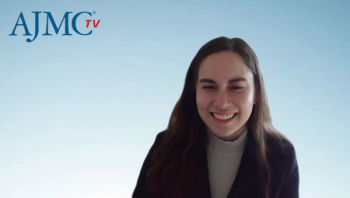
Addressing the Influence of Health Care Organizations on Physician Growth
Health care organizations can help spur growth among physicians through incorporating key experiences, such as out-of-expertise skill building and cross-functional projects, in their physician leadership development programs.
Health care organizations can help spur growth among physicians through incorporating key experiences, such as out-of-expertise skill building and cross-functional projects, in their physician leadership development programs, said Brian M. Parker, MD, chief quality officer for Allegheny Health Network, and Vibhas Ratanjee, senior practice expert with Gallup.
Transcript
AJMC®: Hello, I'm Matthew Gavidia. Today on the MJH Life Sciences’ Medical World News, The American Journal of Managed Care® is pleased to welcome Vibhas Ratanjee, a senior practice expert with Gallup, and Dr Brian M. Parker, chief quality officer of Allegheny Health Network.
Both recently co-wrote a contributor article on
Parker: Sure. I’m Brian Parker, I’m both the chief quality and learning officer at Allegheny Health Network here in western Pennsylvania. I oversee basically all the quality, safety, and value work that contributes to patient care and across the network, both in the inpatient and ambulatory spaces, and that also includes all of our governmental and pay-for-value programs that the network and the hospitals participate in.
Ratanjee: My name is Vibhas Ratanjee, I‘m a subject matter expert with Gallup specializing in health care. I also lead Gallup’s research in the area of leadership development, organizational development, and the future of technology, especially in [human resources]. For health care specifically, a lot of my time is spent researching emerging trends in health care, as well as working with our top health care clients, including Allegheny Health Network.
AJMC®: To start us off, Brian, in your experience within the health care industry, can you discuss some of the intangibles that contribute to better preparedness and quality in care delivery?
Parker: One of the things that we know in medicine and in health care delivery is that reducing variability in the delivery of care, and that particular notion shouldn’t necessarily bump up against what’s considered the practice or the art of medicine, but the ability to actually reduce variation during the practice and as many things that you can affect from a systems perspective, definitely improves quality.
In addition to that, the design of the systems that are there, because so much of health care delivery is done by humans, and so by setting those guardrails up so that the systems aren’t designed to actually allow folks to make mistakes, but actually are forced function systems, so that the human factor that’s part of the delivery of care isn’t allowed to actually get off and outside of those boundaries, so that it reduces the variability and it reduces the potential for either error or harm.
AJMC®: Additionally, Brian, can you share some experiences you perceive as vital to developing future physician leaders, especially amid the ongoing pandemic?
Parker: In the
One of them is really cross-functional projects. People had to come together in health care systems and hospitals in different ways than they ever had before to start to solve problems that they were faced with, not just in the care delivery space, but also the supply chain. Suddenly, the disruption of being able to get medical goods, and in some cases medical services, in the way that we would traditionally deliver them was completely disrupted.
So, a perfect example of that is what we’re doing right now, is what a lot of networks had to suddenly jump to, to not lose contact with their patient, which was a massive escalation of telehealth services. So, instead of that reliance on physical contact, you still had a way to get to be with those patients and keep them on track with their care plans; but that also meant bringing people together from [information technology], the physicians, the other caregivers, and getting technology into places where it didn’t exist initially.
So, there was a huge investment made by a lot of hospital systems for something that they thought was a nice thing to do in the background as a part of traditional medical care that actually became a lifeline for a lot of patients. The other thing I would say would be the out-of-expertise skill building. Again, forced to do things differently than you ever had before. Sometimes, certainly early on in the pandemic, people not knowing how to actually approach some of these patients who were so sick and also how to actually create spaces that never were considered a place where you would deliver care, like Central Park in a tent or a convention center and other places that traditionally in this country, we would have never thought that we would have physicians, nurses, and extenders trying to figure out how to do that in an environment that was never really intended to be an inpatient space, whether it was for critical care or just regular floor care for those patients.
So, those 2 things, cross-functional projects and out-of-expertise skill building, I think were really forced upon us, and I think in many ways, as we’ve heard the stories through the media and on the nightly news, lots of people in many fields in medicine rose to the occasion to be able to actually deal with something that probably at the end of 2019, and beginning of 2020, no one would have imagined what was going to happen in this country by the end of March, beginning of April.
AJMC®: Vibhas, when it comes to managing disruptions within care delivery, either pre–coronavirus disease 2019 or amid the pandemic, what are some strategies health care organizations should consider?
Ratanjee: Disruption is not new to health care, right? And health care has been in the throes of large-scale change transformation for decades, as you all know. I just feel that the demands of health care leadership and the urgency of change is much higher. Our research, the study that we wrote the paper on, actually started pre-pandemic.
A lot of the interviews that we did were before the world changed. As we kind of reflected on the data, what was interesting is that we found that a lot of these high-performing physician leaders that we talked to, they were already set up to drive change and deal with disruption before the pandemic, I think in 3 unique ways.
One, we felt in all those interviews that they were really intentional about gaining the experiences that they knew were important, and many were deliberate in taking sideway steps, for example, or even steps back in their career. In a way, they were kind of disrupting themselves. So, that was 1, they had a really good understanding of the kind of experiences that will accelerate their growth.
I think second, which we thought was really interesting, was that they had this inherent curiosity about leadership, almost like a burning desire to want to learn and to apply the kind of leadership skills that one usually doesn't learn during residency. I think that was 1 important factor, and the way they went about it, many invested in kind of getting that education through either physician MBAs or just voraciously reading management and leadership literature. That was interesting, they were kind of investing in their ability to be relevant as a physician leader.
I think the third was that everybody we spoke to considered leadership and a leadership position to be an important way in which they could contribute to transforming American health care. They knew that even though some of them would end up kind of practicing less and be more involved in admin work, that this is the way they could kind of help transform health care, whether it was process work or patient centricity, and the 2 experiences that Dr Parker mentioned.
Even 1 thing that was interesting was removing administrative barriers for their fellow physicians. So, there’s a calling in physician leadership that they’re really truly understood. I think all of this is really important as this pandemic is kind of reshaping the future of health care, and we have 6 experiences that Dr Parker alluded to, and we detail that in our research paper, quite clearly. We call them crucible experiences for a reason because we do feel that they kind of lead to this ultra-transformative view of leadership and leadership responsibilities.
I think your question was, what can health care organizations do? I think these 3 things. So, you need to encourage physicians to be more intentional in their leadership journey, encourage them to kind of use their curiosity that everybody talked about, and to really help leaders contribute in more radical ways to help transform health care. They need to make key experiences a vital part of their physician leadership development program. It’s not just putting physician leaders in MBA programs so that they learn the conceptual aspects of leadership, but more the practical aspects of leadership is where key experiences come in.
Newsletter
Stay ahead of policy, cost, and value—subscribe to AJMC for expert insights at the intersection of clinical care and health economics.






